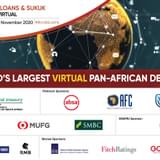|
Background The Federal Republic of Nigeria sought external funding of between US$750mn and US$1bn to help finance the country’s growing deficit which surged to more than US$7bn, help restructure the country’s existing debt, and help finance future infrastructure expenditure. On 9 February, 2017, the African sovereign successfully priced a 15-year US$1bn Eurobond, the longest maturity seen yet on a hard currency issuance out of Nigeria. Transaction Breakdown The transaction followed a London based non-deal roadshow exercise in June 2016 that was solely led by Standard Chartered. Following the establishment of a new General Medium Term Note (GMTN) Programme and the announcement of investor meetings in UK and US, Nigeria priced a very successful US$1bn 15-year Eurobond with a coupon of 7.875% on 9 February, 2017. The transaction was announced 9 February at initial price talk of 8.50% before guidance was tightened to a range of 8.125% -- 8.375% on the back of strong positive reception, before final guidance of 8% area +/- 0.125% was set. With the order books continuing to grow, the deal priced at the tight end of guidance at a yield of 7.875%, with the orderbook recording 370 bids totalling more than US$7.7bn. Bond investors were particularly impressed with the sovereign’s reform plans, and its intention to spend up to 30% of its budget expenditure on infrastructure development. The size of the book also reflected stronger confidence in the price of oil, Nigeria’s main export. |
About 48% of the notes were allocated to accounts based in the US, 37% to accounts in the UK, 10% to accounts in Europe and 5% to Asia and elsewhere. Roughly 73% of the notes were placed with asset managers, 13% hedge funds, 10% insurers and pension funds, and 3% private banks.
The transaction repriced the Nigerian secondary curve, with the 2021 and 2023 bonds tightening in the process.
The issue is Nigeria’s third outing in the international capital markets and the longest tenor and largest orderbook achieved by the sovereign to date.









